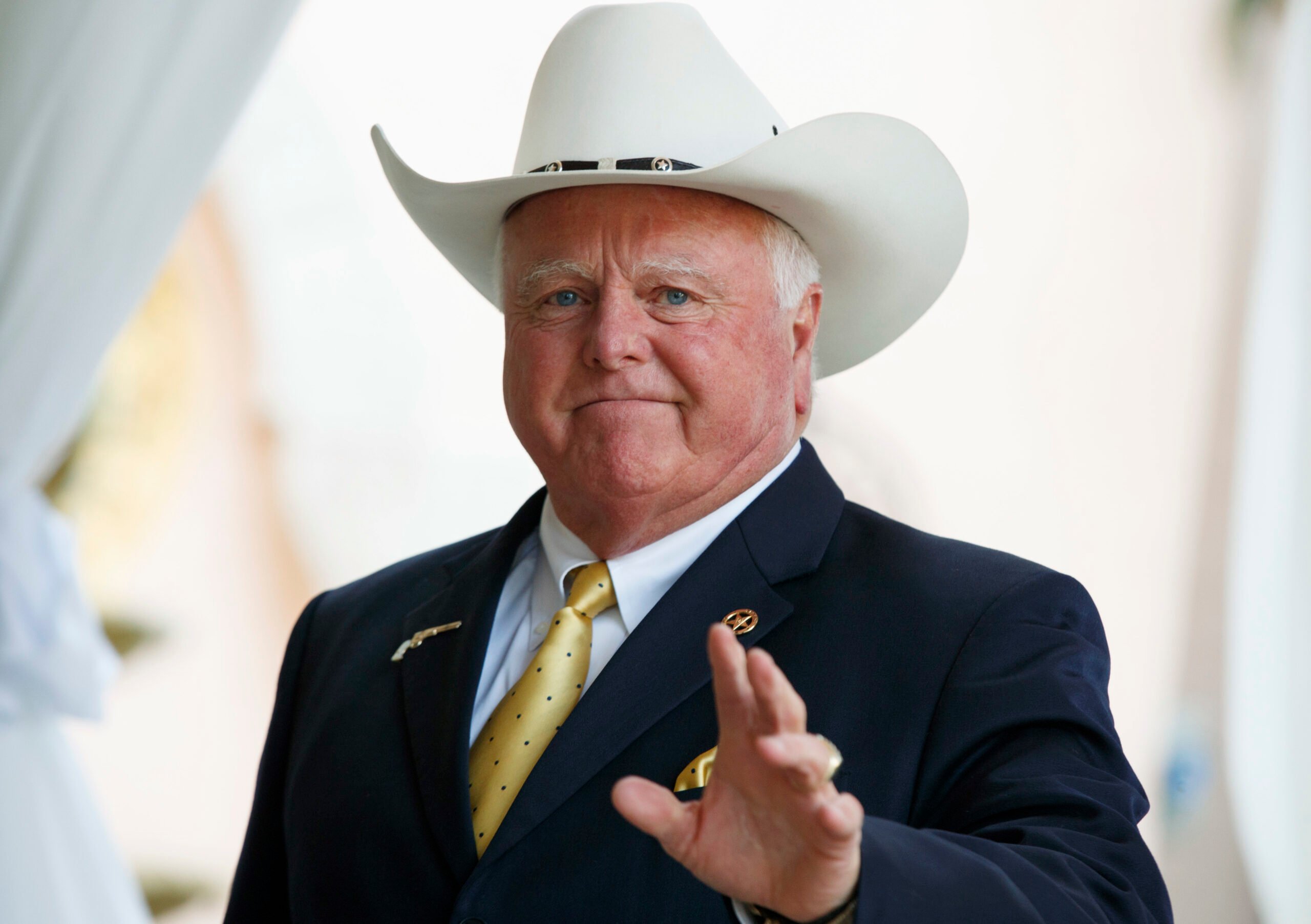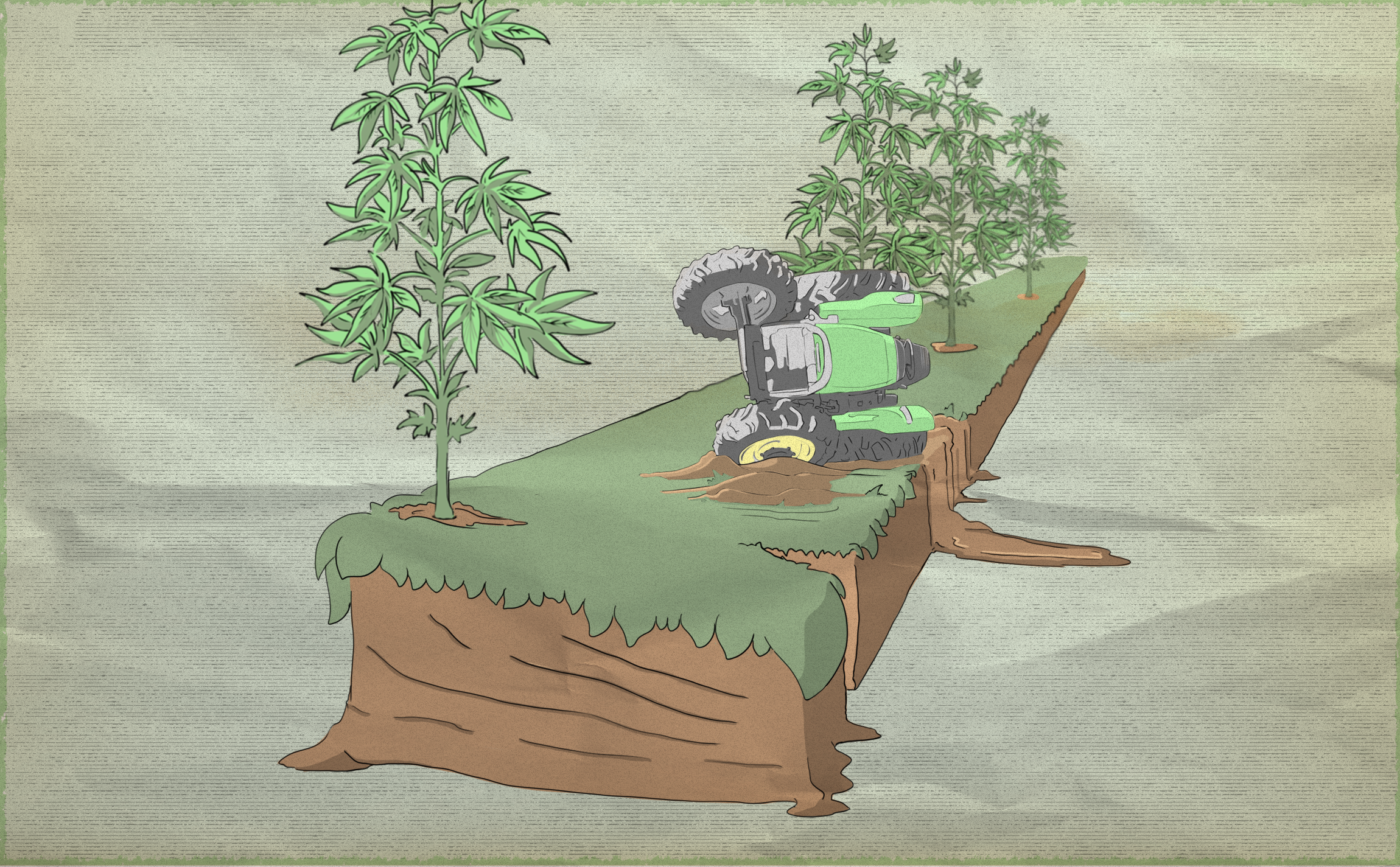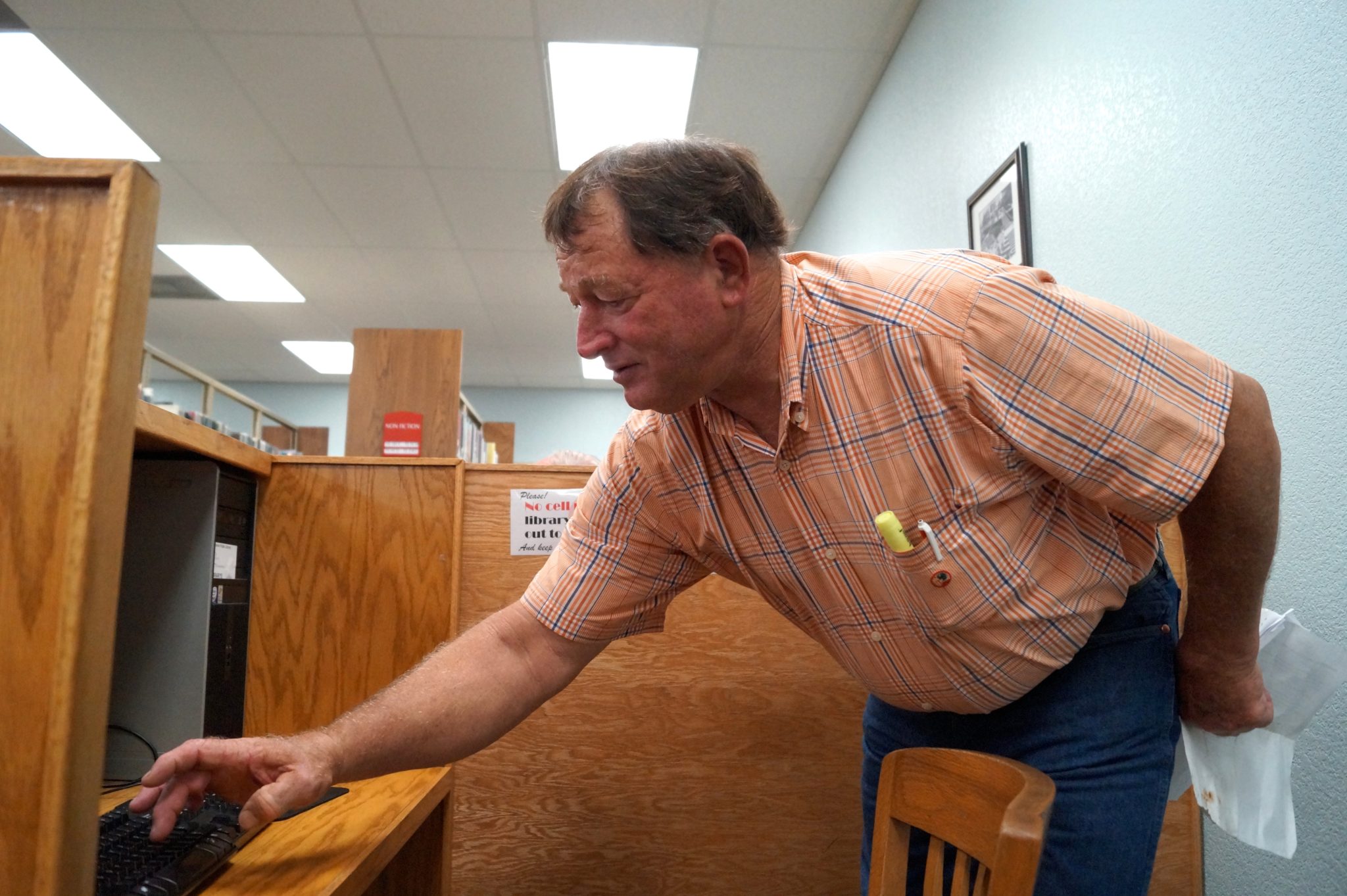
Mighty Jim Hogan and the Art of the Anti-Campaign
Jim Hogan won the Democratic nomination for agriculture commissioner having spent no time and no money in pursuit of it. Now, he's going for the big prize.

Above: Democratic nominee for agriculture commissioner Jim Hogan at the Cleburne Public Library, his de facto campaign headquarters.
Just down the road from the Johnson County Courthouse in Cleburne, Texas, past the theater where a local company is staging a version of “Steel Magnolias,” sits the Cleburne Public Library. In the back, a few rows down from the display with the Louis L’Amour short story collection, Jim Hogan, Democratic nominee for agriculture commissioner, shows off his seat of power. It’s late June, the day before the Democratic Party’s state convention kicks off in Dallas. Hogan could be there, celebrating his unlikely victory. But he doesn’t want to be anywhere near it. Instead, he’s giving a tour of his unofficial campaign headquarters.
From a line of pressed-wood desk cubbies with internet-equipped Dell computers, Hogan, a former dairy farmer with a small cattle operation, ran what must be the most unlikely primary campaign of any Texas Democrat in the modern era. Earlier this year, Hogan found himself in a three-way standoff in the Democratic primary race for agriculture commissioner. His opponents: the party establishment’s favorite candidate, Hugh Asa Fitzsimons III, and a pot-loving troubadour with populist appeal, Kinky Friedman. Hogan bested both. When the unlucky Friedman found himself in a runoff, Hogan smashed him by more than 7 points.
Yet Hogan raised and expended zero dollars in the course of the campaign, and spent the entire race at home, or on the computers at the library, where he monitored the results that appeared when he Googled his name, and researched the job. If you include the $3,750 filing fee he was required to pay to get on the ballot, he spent 1.2 cents a vote. In terms of money and time, he ran an election effort of record-setting efficiency.
While Wendy Davis’ resource-intensive war machine, virtually unopposed and with millions of dollars in hand, lost much of the Rio Grande Valley to an unknown opponent, Hogan cruised to victory with the steady hand of a zen master. On runoff night, reporters found him at a neighbors’ house, cooking “country boy stew,” which features hamburger meat, carrots, tomatoes and green beans.
Like a warrior-monk who has taken a vow of poverty, he not only let his own campaign lie fallow, he refused campaigning from others. When political consultants from Austin came to a summit with Hogan at Cleburne’s Blue Star Grill and offered their services pro bono, Hogan refused. When a neighbor offered to make a pro-Hogan sign and put it in his yard, he declined.
“Take that money and give it your grandkids,” he says he told the neighbors. “What is that sign gonna do? Nothing. People are gonna vote for me cause a sign said ‘Jim Hogan’? I don’t want people to be that shallow.”
Candidates running for statewide office are normally quite appreciative of shallow voters, so this is an unusual declaration. We’re more than halfway through an election season that, even if no more shallow than the last, will be the most expensive in the state’s history. Unimaginable sums of money are being raised and spent. Pricey out-of-state consultants and nomadic campaign hands with big paychecks abound. We’ve moved from a Republican primary for lt. governor, where one of the critical issues was David Dewhurst’s dinner at an Austin steakhouse, to a general election where earnest discussion of the state’s pressing issues is infrequent at best.
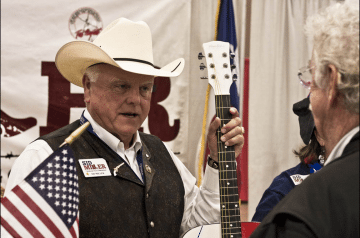
Elsewhere this cycle, races have been mostly fluff. The worst case might be the Republican primary race for agriculture commissioner. J. Allen Carnes, the mayor of Uvalde—serious, thoughtful and earnest—garnered endorsements from agricultural trade organizations, talked about the needs of farmer… and placed fifth in a five-way race. The winner, Sid Miller, counts Ted Nugent as his campaign treasurer and looks and acts like a French cartoonist’s caricature of a Texan. He ran on gun rights and his opposition to abortion, and when asked about agriculture issues, seemed ill-prepared. He opened his speech at the Republican convention with a slightly bawdy story about his wife on election night.
Hogan has been an object of fascination for political junkies and media types. He may have won purely by chance, but his inexplicable success offers some relief from the absurdity and occasional cruelty of Texas political life. A Tumblr set up by admirers records his exploits. A Texas Monthly piece highlighted Hogan’s runoff win as one of the few bright spots of a generally disheartening night. A column Hogan wrote for the op-ed website TribTalk may go down in the record books as the most memorable piece of political rhetoric from the 2014 election:
It has been reported that I am unknown and do not campaign. If you will pause for a moment and Google “Jim Hogan Texas Agriculture Commissioner,” I believe you will be amazed at the amount of information available about me. I think you will agree that those reports can be put to rest.
Why is he doing this? Does he think he can win? Is he a playful imp, or Chauncey Gardiner? After meeting Hogan, it remains difficult to say. This much is certain: Hogan’s not a fool. He knows Miller will be the likely victor. But, he says, he wasn’t supposed to win the last two times. So who knows? He’s got a healthy belly laugh.
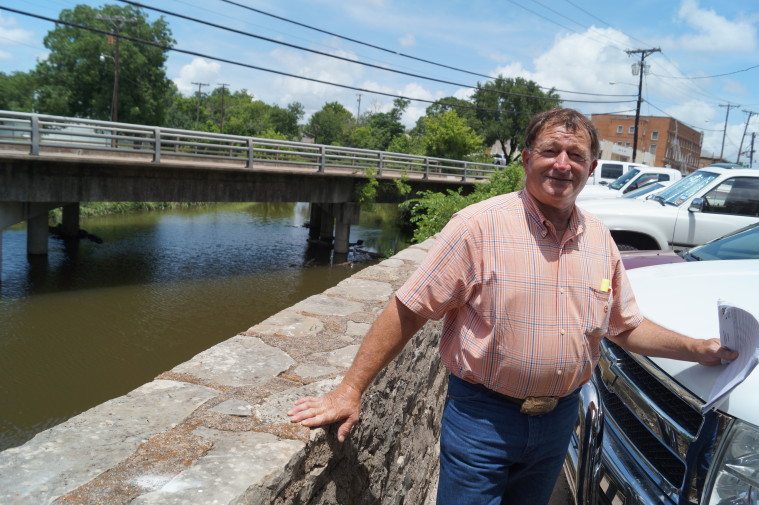
His main contention is: Why not me? Ask Hogan a question, and his tendency is to flip it back on you, like a teacher facing a slow-witted student. Over a burger in the Blue Star Grill, where Hogan conducts his meetings, I ask him: what has Todd Staples, the current agriculture commissioner, been doing wrong?
“I don’t know what Todd Staples has been doing,” he says, “other than buying $300,000 worth of cameras.” Staples, intent to run someday for higher office, spent much of his last term talking about border security. His office spent $345,000 on funding security cameras on the border. “Most of what he does has nothing to do with agriculture,” Hogan says.
What would Hogan do as agriculture commissioner? In point of fact, Hogan says, virtually no one, including many farmers, know who the agriculture commissioner is or what it does, because the office has never done a damn thing for a lot of people it’s supposed to help. He grabs a waitress at the Blue Star Grill and asks her if she knows the agriculture commissioner: She doesn’t. “It’s going to be you, though,” she says as she walks away.
“Grab people up in Dallas and ask them what the ag commissioner does, and they won’t know,” he says. “Nobody knows!”
Has Hogan had experiences with the Department of Agriculture that made him want to run? “I’ve never had anything to do with them,” he laughs. Few have. “If you can get somebody on the phone, you’re lucky.” The office, by rights, should be apolitical. “It should be providing services to farmers and ranchers,” he says. “But most people running for agriculture commissioner have no ties to it, and have probably never studied it.”
I ask Hogan what he’d do if he got the post—the latest of several times I’d tried to broach the question. Would there be some big policy initiative? New programs? He explains it to me, again, a bit slower, to help me understand. On the first day, “I’m going to walk in and do this very methodically,” he says. He’d talk to the department’s officers, and he’d get a good sense of the inefficiencies there. He’d travel around the state and talk to farmers and ranchers. He’d get out there in the field. And then he’d figure out how the department could help.
“I’m going to gather the facts and make logical decisions,” he said. “I don’t want to make a complication when you ought to have simplicity.” Basically, his campaign promise is to work hard and do a good job.
“People like J. Allen Carnes,” he says. “Those people at least have an inkling. But these people that have been in the Legislature all their life, they really don’t get it.” Count his opponent among those who don’t get it. “I know Sid Miller. If you want to drink beer and rope calves, Sid’s your man,” Hogan says. “But all you gotta do is study what he’s done.” That includes a whole lot of lobbying, and a whole lot of politicking.
Hogan’s Democratic opponent didn’t take the job too seriously, either. “Kinky didn’t say anything about agriculture.” Over the course of his political career, Kinky, supposedly the outsider, had showed a particularly cynical brand of politics. For one thing, his campaign staff tried to buy off Hogan with the promise of meeting Willie Nelson. Kinky “did every bad thing in the world but he said what he said in a funny way that made people laugh. I didn’t laugh at all,” he said. “I didn’t think it was funny because I didn’t think that was kosher.”
He’s not laughing because the Texas farmer and the rancher face real problems. “The price of land’s too high. Cities are moving out. There’s more people and less land to grow on it. Nobody wants GMOs or pesticides on their stuff. Well, here comes Mexico, bringing food over,” says Hogan. “We’re hitting the wall. Things are getting worse. The water situation—it’s going to rain sometime. But the next time we have a drought there’s gonna be a lot more people.”
And farmers and ranchers needed to bring younger people into the field. “Today, we’re overlooking daughters. It’s a woman’s world if you hadn’t noticed out there.” Hogan has two himself, which he raised as a single father after his wife passed away in 2000. “In other words, I’m in tune with the world. Top to bottom. And for simple reasons, I want to be agriculture commissioner. You couldn’t give me governor or anything else, it’s got too much baggage. It ain’t worth it. And I only want it for one term. And during that term, I’d hope to find somebody who’d do something similar to what I did.”
Hogan’s running as a Democrat, but only because he thought he had better odds of winning the nomination. If he wins, he’s going to hire Republicans alongside Democrats. He has no particular affection for either party, but he wishes the system worked better, and that people voted more. Texas’ unbalanced party system, he thinks, has screwed up the state. “I thought we had a two party system in America,” he says.
“Don’t vote Republican or Democrat, look at the person. I don’t even know what a party is, other than the people that run it,” he says. “If you’re a Republican and you got a bad person, and the Democrats have a good person, you’re going to vote the bad person just because he’s a Republican?”
On all matters, Hogan preaches moderation. “I like all people, that’s my philosophy,” he said. Around Cleburne, plenty of people have gotten heated about increasing numbers of immigrants—some won’t go to the H-E-B anymore because there’s too many unfamiliar faces. But Hogan is calm. Migrants “come here to work hard and send money home to their family.” He thinks open carry protesters are silly. “Just cause you can don’t mean you have to,” he says. “That’s the thing with politics everywhere. There’s extremes, and there’s people with logic.”
Hogan may claim the mantle of logic, but in Texas, logic is not enough. Barring the discovery of Miller in bed with, in the immortal words of Edwin Edwards, a dead girl or a live boy, his party affiliation will trump Hogan’s and Miller will spend a number of years doing whatever it is he wants to do in statewide office, before presumably trying to make the jump to another one.
In theory, Americans like people like Hogan—genuine outsiders, rough-hewn pragmatists, underdogs. There used to be more people like Hogan in public office. In practice, today’s strivers come from a very different mold.
Officeholders are as different from us as an alien race. In national races, we’ve come to expect our campaigns, and our campaigners, to function with the mechanical precision and sleek design of a Swiss watch. A wrong word or a step out of place can doom a person’s political fortunes, and so actual fortunes are spent on ensuring that doesn’t happen. Candidates never have a chance to show their real selves, and they become alienated from us. And we become alienated from the political process.
In Texas, at the state and local level, the political process has become perverted in a very different way. A vanishingly small number of voters have a say in the way the state is run, thanks to the total dominance of the Republican Party and its primary elections. Statewide candidates like Miller face little accountability from voters once they get past their primary runoff. Party affiliation is the golden god of Texas politics, and the state is left with demagogues of all stripes running virtually unopposed. Apathy grows, and many voters tune out.
Hogan wants no part of any of that. “I realized that when I signed up to run, I became a product,” he says. “I don’t want to be anything that I’m not.”
Hogan won’t change all that, but he’s having fun trying. “There’s a lot of people around town laughing and having a ball about this, because they know who I am,” Hogan laughs. “A lot of my neighbors wanted clips for their scrapbooks. They never thought Jim Hogan, who mows his lawn with a push mower, would get here.”
Correction: The article formerly identified Jim Hogan as a dairy farmer. Hogan is a former dairy farmer who currently has a small cow-calf business.

